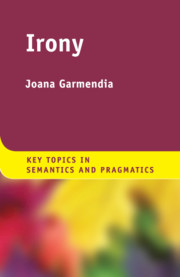Book contents
- Irony
- Key Topics in Semantics and Pragmatics
- Irony
- Copyright page
- Dedication
- Contents
- Figures
- Acknowledgements
- 1 Introduction
- 2 Irony as Opposition
- 3 Irony as Echo
- 4 Irony as Pretence
- 5 Attitude Expression in Irony
- 6 Clues of Irony
- 7 Sarcasm and Humour
- Examples Used in Text
- Glossary
- Bibliography
- Index
- References
3 - Irony as Echo
Published online by Cambridge University Press: 06 March 2018
- Irony
- Key Topics in Semantics and Pragmatics
- Irony
- Copyright page
- Dedication
- Contents
- Figures
- Acknowledgements
- 1 Introduction
- 2 Irony as Opposition
- 3 Irony as Echo
- 4 Irony as Pretence
- 5 Attitude Expression in Irony
- 6 Clues of Irony
- 7 Sarcasm and Humour
- Examples Used in Text
- Glossary
- Bibliography
- Index
- References
Summary
- Type
- Chapter
- Information
- Irony , pp. 42 - 64Publisher: Cambridge University PressPrint publication year: 2018
References
- 2
- Cited by



